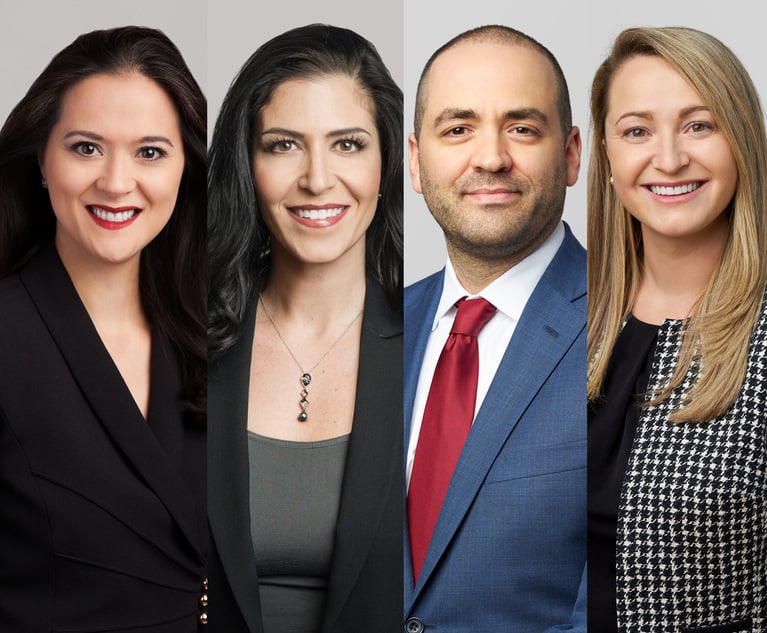Pensioners Find New Legal Strategy After Archdiocese Plan Goes Bust
Pensioners are pursuing state claims accusing the Archdiocese of Newark of short-changing a hospital pension plan by $2.7 million.
May 09, 2019 at 04:40 PM
5 minute read
 Photo: iStock
Photo: iStock
The Archdiocese of Newark has been hit with a lawsuit accusing it of short-changing a hospital pension plan by $2.7 million.
The suit was filed May 7 in Superior Court of New Jersey in Essex County on behalf of a class of retirees from Archdiocese-run hospitals whose pension checks ran out in 2017. The suit takes a new approach in the first-suit-of-its-kind lawsuit after the Supreme Court ruled in June 2017 that retirement plans of religious-affiliated nonprofit organizations are exempt from the regulations of federal pension law. Unlike other suits brought of behalf of retirees in pension plans tied to religious organizations, which relied on federal law, the Archdiocese of Newark suit only brings state-law claims.
The suit was brought on behalf of roughly 135 former employees of the hospital system run by the archdiocese, who were members in the St. James Hospital of Newark Retirement Income Plan.
The St. James plan came under regulation of ERISA when it was enacted in 1974, requiring annual contributions to ensure the plan could pay the benefits it had promised. The archdiocese announced in 1988 that it planned to terminate the St. James pension plan but it said the move would not reduce or adversely impact the vested benefits of any plan beneficiary. The archdiocese obtained a ruling from the Internal Revenue Service in 1990 granting the St. James pension plan a “church plan” exemption from the regulations of ERISA. After that ruling, funds were moved out of accounts earmarked for St. James retirees to other accounts for the benefit of the Archdiocese, the suit claims.
After obtaining the religious exemption, the archdiocese began to reorganize pension plans from St. James and other hospitals into a single pension program called Cathedral Health Services Pension Plan. In 1996, the Cathedral Health Services plan had a $20 million surplus, but a subaccount for former St. James employees had a $2.7 million deficit, the suit claims. But the archdiocese did not want to cover that deficit with the $20 million surplus and instead decided to cover the debt by reducing benefits. It did not eliminate the benefits of anyone who had already retired because it had already purchased annuities for them. But it opted to reduce the benefits of people who were former employees of St. James who had not started receiving their pensions, the suit claims.
The diocese knew it was not providing enough money to pay lifetime benefits to the plaintiffs and class members, but it continued to maintain in communications with those persons that they would receive lifetime retirement benefits, the lawsuit claims.
In 2016, Transamerica Insurance Co., which was managing the Archdiocese pension account, sent a letter to plaintiffs and class members stating that funds in the plan would be depleted in five to seven months. The letter also said there would be no further pension payments after that point. The pensioners “depended on the pension payments for food and shelter in their retirement. They had no idea before this letter arrived that their pensions were at risk,” the lawsuit said.
The St. James suit brings claims for breach of contract, promissory estoppel and breach of fiduciary duty. When the St. James pension was governed by ERISA, it was exempt from suits for anything other than failure to pay benefits, said Richard Meisner of Jardim, Meisner & Susser in Florham Park, who represents the plaintiffs.
Now that the plan is a church plan, it becomes open to a wide variety of suits, said Meisner, who offered the example of a personal injury suit on behalf of an elderly pensioner who suffers a stroke as a result of worrying about the loss of her pension benefits.
“Once you leave ERISA, you've lost something called preemption, a shield from every single claim under the sun. Now that they're no longer under ERISA, you can sue under trust law, sue for punitive damages, consequential damages. This type of case becomes a Pandora's box for plaintiffs attorneys,” said Meisner.
The U.S. Supreme Court case upholding the rights of church plan pensions concerned three hospitals, including St. Peter's in New Brunswick, which was sued by members of its pension program who claimed in a suit that the plan was underfunded. The U.S. Court of Appeals for the Third Circuit said St. Peters' pension plan was not entitled to a church plan exemption because it was not founded by a church. But the Supreme Court overruled that decision.
Meisner is representing the plaintiffs and the class along with Michael Gilberti of his firm and Edward Scallet of EascoLaw in Washington, D.C.
Charles Carella of Carella, Byrne, Cecchi, Olstein, Brody & Agnello in Roseland, outside general counsel for the archdiocese, said of the suit, “we have only recently received, and are reviewing, the complaint and, therefore, we are not in a position to comment at this time.”
This content has been archived. It is available through our partners, LexisNexis® and Bloomberg Law.
To view this content, please continue to their sites.
Not a Lexis Subscriber?
Subscribe Now
Not a Bloomberg Law Subscriber?
Subscribe Now
NOT FOR REPRINT
© 2025 ALM Global, LLC, All Rights Reserved. Request academic re-use from www.copyright.com. All other uses, submit a request to [email protected]. For more information visit Asset & Logo Licensing.
You Might Like
View All
On the Move and After Hours: Einhorn Barbarito; Gibbons; Greenbaum Rowe; Pro Bono Partnership
4 minute read

Engine Manufacturer Escapes Suit Over NJ Helicopter Crash That Killed Country Music Star
3 minute readTrending Stories
Who Got The Work
J. Brugh Lower of Gibbons has entered an appearance for industrial equipment supplier Devco Corporation in a pending trademark infringement lawsuit. The suit, accusing the defendant of selling knock-off Graco products, was filed Dec. 18 in New Jersey District Court by Rivkin Radler on behalf of Graco Inc. and Graco Minnesota. The case, assigned to U.S. District Judge Zahid N. Quraishi, is 3:24-cv-11294, Graco Inc. et al v. Devco Corporation.
Who Got The Work
Rebecca Maller-Stein and Kent A. Yalowitz of Arnold & Porter Kaye Scholer have entered their appearances for Hanaco Venture Capital and its executives, Lior Prosor and David Frankel, in a pending securities lawsuit. The action, filed on Dec. 24 in New York Southern District Court by Zell, Aron & Co. on behalf of Goldeneye Advisors, accuses the defendants of negligently and fraudulently managing the plaintiff's $1 million investment. The case, assigned to U.S. District Judge Vernon S. Broderick, is 1:24-cv-09918, Goldeneye Advisors, LLC v. Hanaco Venture Capital, Ltd. et al.
Who Got The Work
Attorneys from A&O Shearman has stepped in as defense counsel for Toronto-Dominion Bank and other defendants in a pending securities class action. The suit, filed Dec. 11 in New York Southern District Court by Bleichmar Fonti & Auld, accuses the defendants of concealing the bank's 'pervasive' deficiencies in regards to its compliance with the Bank Secrecy Act and the quality of its anti-money laundering controls. The case, assigned to U.S. District Judge Arun Subramanian, is 1:24-cv-09445, Gonzalez v. The Toronto-Dominion Bank et al.
Who Got The Work
Crown Castle International, a Pennsylvania company providing shared communications infrastructure, has turned to Luke D. Wolf of Gordon Rees Scully Mansukhani to fend off a pending breach-of-contract lawsuit. The court action, filed Nov. 25 in Michigan Eastern District Court by Hooper Hathaway PC on behalf of The Town Residences LLC, accuses Crown Castle of failing to transfer approximately $30,000 in utility payments from T-Mobile in breach of a roof-top lease and assignment agreement. The case, assigned to U.S. District Judge Susan K. Declercq, is 2:24-cv-13131, The Town Residences LLC v. T-Mobile US, Inc. et al.
Who Got The Work
Wilfred P. Coronato and Daniel M. Schwartz of McCarter & English have stepped in as defense counsel to Electrolux Home Products Inc. in a pending product liability lawsuit. The court action, filed Nov. 26 in New York Eastern District Court by Poulos Lopiccolo PC and Nagel Rice LLP on behalf of David Stern, alleges that the defendant's refrigerators’ drawers and shelving repeatedly break and fall apart within months after purchase. The case, assigned to U.S. District Judge Joan M. Azrack, is 2:24-cv-08204, Stern v. Electrolux Home Products, Inc.
Featured Firms
Law Offices of Gary Martin Hays & Associates, P.C.
(470) 294-1674
Law Offices of Mark E. Salomone
(857) 444-6468
Smith & Hassler
(713) 739-1250







